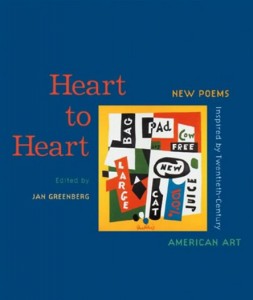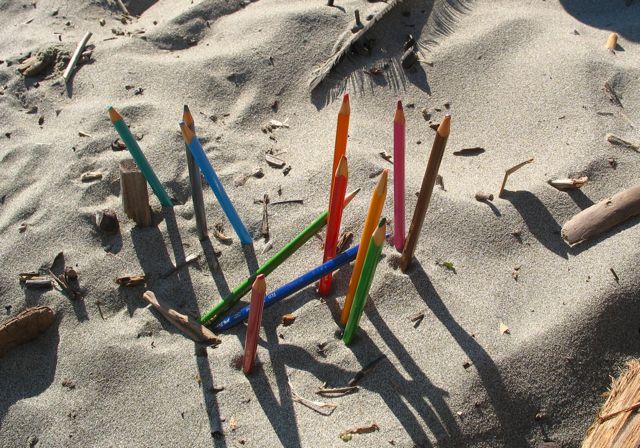Creating, in all kinds of ways–writing, drawing, beach sculpture, improv, more–has been a lifelong joy for me. However in recent years when I think of creativity, the first thing that comes to my mind is children writing poetry.
I have been fortunate to have opportunities to teach children poetry in partnership with a wonderful and skilled elementary school teacher, Deborah Weinstein, on a few occasions in the past couple years, including a 12-week afterschool class. We plan to do it again next fall.
Though our expectations were never low, we found ourselves impressed again and again with what the children created—the beauty, the cleverness, the humor, the meaning, and the deft use of poetic techniques.
One lesson worked so well in her second grade class that we did it again in the afterschool program. The topic was ekphrastic poetry, which is poetry inspired by a work of visual art. As Jan Greenberg describes and demonstrates so beautifully in her rich collection, Heart to Heart: New Poems Inspired by Twentieth Century American Art, ekphrastic poems can fall into a variety of categories, including stories, description, interpretation, and giving voice to a depicted object or person.
 After discussing several ekphrastic poems in a group, the students choose art, in the form of cut pages from art calendars laid out around the room. Then they were let loose to write ekphrastic poems.
After discussing several ekphrastic poems in a group, the students choose art, in the form of cut pages from art calendars laid out around the room. Then they were let loose to write ekphrastic poems.
The first time we did this we wondered if the assignment would be too abstract. Instead it was as though we’d just released some poetry-writing fish into water. The excitement and enthusiasm levels were high. The poems were brilliant. Some children wrote multiple poems. Sometimes several children wrote about the same piece of art, creating fascinating opportunities to compare.
We’ve come to think that children’s natural, uninhibited creativity when met with the creativity of visual artists, blossoms to the extreme. To me, ekphrastic poems have become the epitome of creativity. One person’s creation inspiring another’s.
So here’s a recipe for a creative bonanza: Choose a painting, sculpture, photograph or other piece of art that attracts you. Let your inner muse loose. Write a poem. OR choose a poem that attracts you, and let it inspire you to paint, draw, photograph, or sculpt.
 “Pizazz” (below) is an ekphrastic poem that I wrote, inspired by Andy Warhol’s 1983 color screenprint, Grevy’s Zebra, which you can see here. If you’re left wanting more poetry, visit Diane Mayr’s Random Noodling blog. She is hosting Poetry Friday this week.
“Pizazz” (below) is an ekphrastic poem that I wrote, inspired by Andy Warhol’s 1983 color screenprint, Grevy’s Zebra, which you can see here. If you’re left wanting more poetry, visit Diane Mayr’s Random Noodling blog. She is hosting Poetry Friday this week.
PIZAZZ (inspired by Grevy’s Zebra by Andy Warhol) Zip! My stripes dazzle, Surprise, a Confusing maze. I zoom. I zigzag. Am I arriving? Or leaving? Have I got your eyes In a daze? Zing! Are you dizzy? Where’s my start? My end? Observe Closely. You’ll See less of me, the Wizard of active haze. I’m Grevy’s Zebra. Or am I? Karin Fisher-Golton, ©2013
And one more thing on Amazing May 29…I want to acknowledge and express my gratitude for the the life and work of Maya Angelou. I love the beauty and meaning in her writing, and I love the way she read her own words. Click here, to hear Maya Angelou read her poetic picture book Life Doesn’t Frighten Me.
Thank you, artists of all kinds. Thank you to the artist in all of us.


Wow, ekphrasis with second graders! You and I, Karin, share a love of ekphrastic poetry. Thanks for spreading the word!
And you did such a fine job of it with “Two Cents a Quart”! I really do love those ekphrastic poems–love reading them, love writing them, love seeing others write them.
Lovely post, Karin. I’ve always enjoyed ekphrastic poems and really like yours — hadn’t seen that particular Warhol work before. The zip and zing of pizazz is perfect! Zoinks!
Thanks, Jama! One of the members of my children’s poet critique group found “Grevy’s Zebra.” Over a year ago, we each picked a few compelling pieces of art, and chose someone else’s to write about. That was my introduction to ekphrastic poetry. I ended up writing about three! I love it. And thank you for the zesty words about “Pizazz.”
Fun form you used (and neat artwork you chose)!
Thank you, Tabatha!
Hi, Karin. I agree with you. It’s amazing what even emerging writers are capable of creating. Of course, they are experts at using language as speakers! Ekphrastic poetry is a great way to get children writing. Providing art work gives them something concrete to think and write about.
How interesting–I thought of the artwork as abstract, but you are right it is concrete in another way. Thanks, Laura.
How wonderful that you were able to release such a rush of creativity with those children.
And hello! Zip! Zing! Your poem sings!
“Rush of creativity” is a great way to describe it. And thank you for the zippy, rhyming words about my poem!
I love the ‘wizard of active haze’, Karin. Lessons like these are so exciting. I’ve had lovely times taking students to our art museum & letting them choose an art piece, then write. It’s always about story, I think, & even the little ones have the gift of story. Thank you!
Thank you, Linda. I’m grinning that you mentioned “wizard of active haze.”
Beginning an ekphrastic poetry lesson at an art museum sounds wonderful. Our students wrote a lot of story poems, but maybe even more voice poems, and a few interpretation poems. They sure do have the gift of story.
This sounds like a good beginning of the year poetry writing ice-breaker! (Look at me — gathering ideas for the start of the next school year when the current one is still a day away from being finished!!)
More evidence that you must be a great teacher! Thank you for stopping by and happy summer!
Such fun! I have’t done these yet this year, and your post reminds me that I mustn’t waste any more time.
They sure are fun, and sometimes surprising. Enjoy!